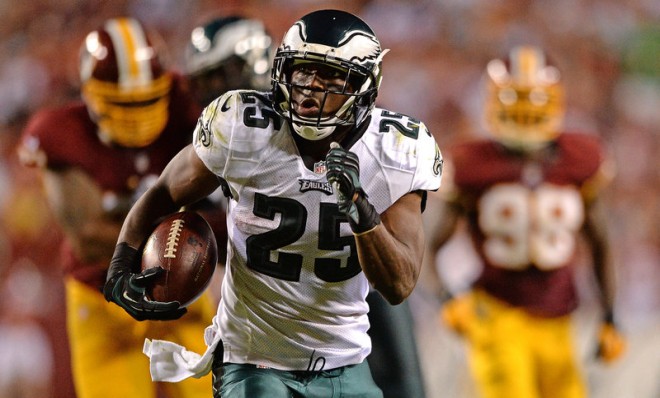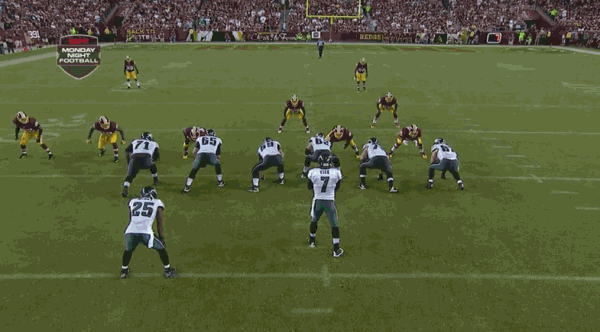Chip Kelly's fast-paced NFL revolution is finally here
The Eagles' new head coach aims to bring his newfangled offense from college to the pros


A free daily email with the biggest news stories of the day – and the best features from TheWeek.com
You are now subscribed
Your newsletter sign-up was successful
Down. Set. Hike.
The 2012 Oregon Ducks, led by then-head coach Chip Kelly and his innovative, fast-paced offense, racked up an astounding 62.5 points per game, the third-highest in college football.
Now that Kelly has made the leap to the NFL, he's brought that up-tempo style of play with him. And in Monday's season opener against Washington, Kelly and his Philadelphia Eagles showed just how explosive that offense can be, while offering a peek at what the future of the NFL might look like.
The Week
Escape your echo chamber. Get the facts behind the news, plus analysis from multiple perspectives.

Sign up for The Week's Free Newsletters
From our morning news briefing to a weekly Good News Newsletter, get the best of The Week delivered directly to your inbox.
From our morning news briefing to a weekly Good News Newsletter, get the best of The Week delivered directly to your inbox.
By halftime, the Eagles had run 53 plays, the most by any team in a single half since 1998. The Eagles finished with 77 plays on the day — and would have had more had they not bled the clock in the second half — the third-most of any team in the NFL's opening week.
Kelly's offense relies on two main components: Pace and spacing. And though the look is atypical, it's premised on the same ideas that have dominated football for years, namely creating and then exploiting mismatches.
"Chip Kelly's offense works not because it's a gimmick, but because rather than choose sides between old and new, Kelly's teams straddle history," Grantland's Chris Brown wrote last year of Kelly's Ducks. "Oregon is successful because it does well what good teams have always done well, albeit with a slightly more modern wardrobe."
Kelly runs a spread offense that frees up space in the center of the field. Rather than line everyone up in the middle and pound the ball into the defense, as teams used to do, Kelly's formations open up room for his runners to move. Like teams of yesteryear, Kelly's squads still rely on the running game, but through a tweaked formation.
A free daily email with the biggest news stories of the day – and the best features from TheWeek.com
Having a dual-threat quarterback like Michael Vick allows the Eagles to exploit this scheme even more. Running zone-read plays — in which the quarterback hands the ball off or runs it himself depending on how the defense reacts — effectively forces one defender to track the passer and leave someone else open, or vice versa. When run to perfection, it can give a ball carrier plenty of space to rip off a huge gain, as this gif from last night's game, via SB Nation, shows:

Kelly's squads also keep the defense on its heels by employing a no-huddle offense. By lining up immediately, his teams catch the defense off guard or out of position, and prevent them from subbing out tired players. Kelly's teams don't need to run full steam all the time, though; the sheer "threat of it keeps the defense off balance," says SB Nation's Matthew Fairburn.
It's a tactic the New England Patriots have adopted, with great success, in recent years.
Yet other coaches are less convinced the fast-paced game is anything more than a hokey, cheap trick. Alabama head coach Nick Saban even suggested that it was dangerous since it left unprepared players vulnerable.
"I don't blame any offensive coach for wanting to do it," Saban said last year. "But I just think that someone should examine: Is this where we want this to go for player safety?"
Kelly's offense worked well at the college level, where defenses are slower and smaller than in the pros, so there are questions about how it will hold up over an entire season against stiffer, better-conditioned competition. There's also the chance that Kelly's Eagles will burn themselves out with that frenetic pace as the season goes on, as opposed to grinding down their competition.
"I've never been a part of anything like this," quarterback Michael Vick said after the game. "When the first quarter was over, I thought we were about to go into halftime. Unreal. The only thing I could tell myself was, 'It's going to be a long season.'"
Still, Kelly is committed to his scheme — and is even looking for his team to work quicker in the future.
"I felt like it was slow, to be honest with you," he said of the game's pace, adding, "We could have sped things up."
Jon Terbush is an associate editor at TheWeek.com covering politics, sports, and other things he finds interesting. He has previously written for Talking Points Memo, Raw Story, and Business Insider.
-
 House votes to end Trump’s Canada tariffs
House votes to end Trump’s Canada tariffsSpeed Read Six Republicans joined with Democrats to repeal the president’s tariffs
-
 Bondi, Democrats clash over Epstein in hearing
Bondi, Democrats clash over Epstein in hearingSpeed Read Attorney General Pam Bondi ignored survivors of convicted sex offender Jeffrey Epstein and demanded that Democrats apologize to Trump
-
 Are Big Tech firms the new tobacco companies?
Are Big Tech firms the new tobacco companies?Today’s Big Question Trial will determine if Meta, YouTube designed addictive products
